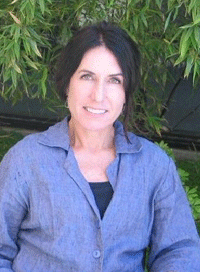

When Teenie Matlock was a child in nearby Mariposa, she listened to deer-hunting stories told by her paternal grandfather, who was part Sierra Miwok. She remembers him drawing symbols in the dirt as he spoke. For example, a dotted line represented a trail or route, and an x represented a person or animal. To his young granddaughter, the symbols didn’t seem to correspond to the concepts he was describing.
Matlock has traveled her own dotted line in life so far, and it has come full circle in more ways than one. As a child family members jokingly called her the ear because of her constant monitoring of what people around her were doing or saying. Now she recognizes it as a strong interest in how people think and communicate. After studying linguistics and psychology at Fresno State, UC San Diego and UC Santa Cruz, plus a postdoctoral position at Stanford, she has returned to the region as a UC Merced founding professor to help start a program in cognitive science.
Her research focuses on how people mentally represent and understand spatial language, exploring how speech is integrated with perception, imagery and physical action. With the added perspective of her years of study in cognitive science, she says her grandfather’s storytelling methods make more sense.
People frequently do physical actions, like pointing or gesturing, while they are giving directions or describing how something looks, she says. These actions allow the speaker to offload computation and provide more accurate description of a scene.
Matlock describes cognitive science as the interdisciplinary study of thinking. It combines various methods to understand the way people think, remember, perceive and communicate. Cognitive scientists have degrees in fields as diverse as psychology, neuroscience, computer science, linguistics, anthropology or philosophy. UC Merced will create an interdisciplinary cognitive science program bringing in elements from fields like these, starting with a strong emphasis on language and high-level cognition.
We’re shooting high to bring in world-class cognitive researchers and first-rate Ph.D. students, Matlock explains. Because the vision of UC Merced is interdisciplinary, cognitive science is a perfect fit.






